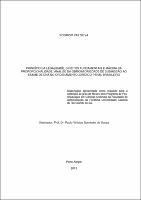| Share record |


|
Please use this identifier to cite or link to this item:
https://tede2.pucrs.br/tede2/handle/tede/4926| Document type: | Dissertação |
| Title: | Princípio da legalidade, direitos fundamentais e máxima da proporcionalidade : análise da obrigatoriedade de submissão ao exame de DNA no ordenamento jurídico-penal brasileiro |
| Author: | Silva, Rodrigo Vaz  |
| Advisor: | Souza, Paulo Vinicius Sporleder de |
| Abstract (native): | Esta dissertação versa sobre a utilização do exame de DNA sem o consentimento do acusado como técnica identificativa no ordenamento jurídico-penal brasileiro. Para tanto, parte do estudo do princípio da legalidade, que se impõe como garantia dos cidadãos de não ser obrigado a fazer ou deixar de fazer alguma coisa senão em virtude de lei, de forma a avaliar seus reflexos na teoria da prova. São avaliados também os direitos fundamentais apontados pela jurisprudência que podem estar envolvidos neste caso, de modo a buscar o suporte fático destas normas à luz da teoria dos princípios. O teste de proporcionalidade serve como instrumento de verificação da conformação constitucional da utilização de medida restritiva de direitos fundamentais necessária à obtenção de material genético, além de indicar os pressupostos e requisitos impostos à sua apreciação. Utilizando de análise bibliográfica, jurisprudencial e legal para analisar os problemas propostos, o presente trabalho investiga a possibilidade de introduzir no âmbito jurídico-penal brasileiro as intervenções corporais necessárias à realização do exame de DNA de forma plena, mesmo quando o acusado se negar a permitir que se obtenha o material necessário. |
| Abstract (english): | This dissertation focuses on the utilization of the DNA testing without the consent of the accused as an identification technique in Brazilian criminal law. Therefore, it begins studying the principle of legality, which applies as a guarantee of the citizens to not be compelled to do or refrain from doing anything except by virtue of law, analyzing its effects on the proof theory. Are taken into account also the fundamental rights raised by the jurisprudence that may be involved in this case in order to seek the factual support of these standards in light of the theory of principles. The proportionality test serves to verify the constitutional conformation of the utilization of a measure that restricts fundamental rights that is necessary to obtain genetic material, besides indicating the prerequisites and terms applied to appreciation of the measure. Utilizing literature, case law and legal review to consider the issues proposed, this text investigates the possibility of introducing in the Brazilian criminal law the bodily interventions required to utilize the DNA exam fully, even when the accused refuses to allow the extraction of the necessary materials. |
| Keywords: | DIREITO PROCESSUAL PENAL DNA CONSENTIMENTO (DIREITO) PRINCÍPIO DA LEGALIDADE DIREITOS FUNDAMENTAIS |
| CNPQ Knowledge Areas: | CNPQ::CIENCIAS SOCIAIS APLICADAS::DIREITO |
| Language: | por |
| Country: | BR |
| Publisher: | Pontifícia Universidade Católica do Rio Grande do Sul |
| Institution Acronym: | PUCRS |
| Department: | Faculdade de Direito |
| Program: | Programa de Pós-Graduação em Ciências Criminais |
| Citation: | SILVA, Rodrigo Vaz. Princípio da legalidade, direitos fundamentais e máxima da proporcionalidade : análise da obrigatoriedade de submissão ao exame de DNA no ordenamento jurídico-penal brasileiro. 2013. 22 f. Dissertação (Mestrado em Ciências Criminais) - Pontifícia Universidade Católica do Rio Grande do Sul, Porto Alegre, 2013. |
| Access type: | Acesso Aberto |
| URI: | http://tede2.pucrs.br/tede2/handle/tede/4926 |
| Issue Date: | 19-Mar-2013 |
| Appears in Collections: | Programa de Pós-Graduação em Ciências Criminais |
Files in This Item:
| File | Description | Size | Format | |
|---|---|---|---|---|
| 449567.pdf | Texto Parcial | 116.45 kB | Adobe PDF |  Download/Open Preview |
Items in DSpace are protected by copyright, with all rights reserved, unless otherwise indicated.




